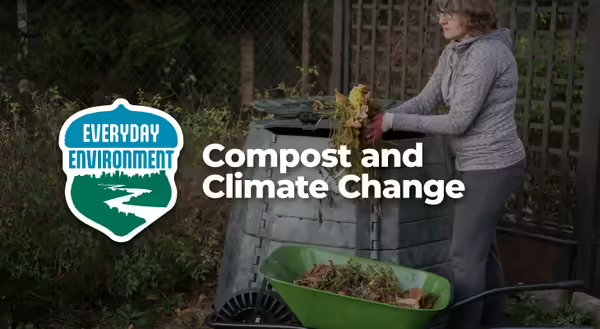
The problem with food scraps in landfills
In the U.S., food waste is a big problem. Nationally, landfills and trash incinerators receive 167 million tons of garbage a year. Half of that is compostable and 21% is food scraps. This means that of the 19 million tons of garbage going to Illinois landfills each year, 4 million tons are food scraps!
Landfills are anerobic environments, meaning there is little to no oxygen. When microorganisms break down organic materials decompose in an anaerobic environment, methane is released. On the other hand, when oxygen is available, like during composting, which more closely mimics natural decomposition, carbon dioxide is released. Both molecules are greenhouse gases, but methane is four times more powerful than carbon dioxide.
We can start to push the needle to decrease human caused methane emissions by keeping organics like food scraps out of landfills – less organics in landfills means less landfill generated methane in the atmosphere.
Other benefits of compost and composting
In addition to reducing methane, the process of composting produces compost, a valuable resource that can be used to decrease runoff and control erosion. Different textures of compost can be used as “blankets” or “socks” to help capture, clean, and divert stormwater while decreasing runoff and erosion.
Compost can also support soil health by improving soil water holding capacity, benefiting plants. Compost contains essential plant nutrients which are slowly released over time, reducing the need for commercial fertilizers in gardens and landscapes. Some composts have been shown to reduce soil-borne pathogens, particularly those that cause root rots (depending on the type of materials composted). Compost can’t provide all nutrients at the right time or fix all of our soil problems, but it is extremely helpful!
Composting and compost can also contribute to a circular economy that focuses on systems of production and consumption where nothing is wasted and everything has value. For example, by recycling food waste into compost, we create a soil amendment that can be used to grow more food. It is an alternative option to the linear economy which extracts finite resources, makes something from them, and then disposes of them.
Resources
- IL EPA Food Waste
- Climate Change Impacts and Costs to Illinois Communities from the Prairie Research Institute
- Using compost to capture, clean, and divert stormwater from the Illinois Food Scrap Coalition
Thank you for reading!
Everyday Environment is a series of blogs, podcasts, webinars and videos on exploring the intricate web of connections that tie us to the natural world. Check out the podcast episode on this topic to hear more about composting and climate change with Sue Gasper and Gemini Bhalsod.
Subscribe to Everyday Environment Newsletter More about Everyday Environment